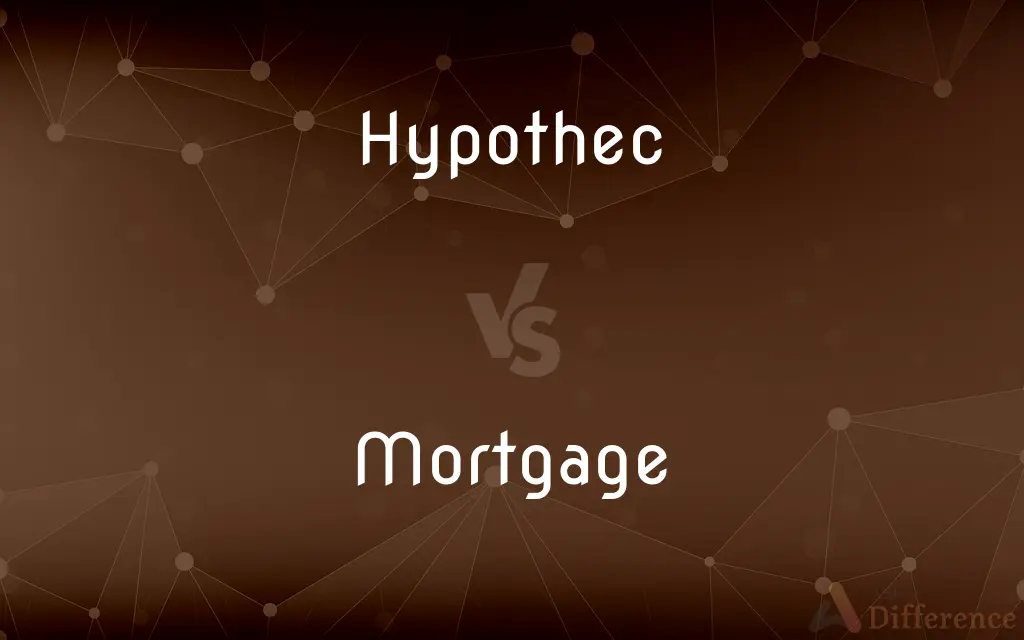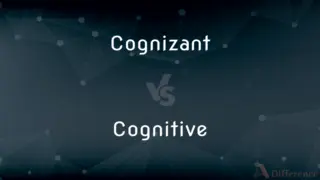Hypothec vs. Mortgage — What's the Difference?
By Tayyaba Rehman & Urooj Arif — Updated on April 4, 2024
A hypothec is a legal right granted over property to secure a debt without transferring ownership, common in civil law jurisdictions, while a mortgage involves a legal agreement where property is used as collateral for a loan in common law systems.

Difference Between Hypothec and Mortgage
Table of Contents
ADVERTISEMENT
Key Differences
A hypothec creates a security interest in movable or immovable property to guarantee the payment of a debt, allowing the debtor to retain possession. In contrast, a mortgage, prevalent in common law jurisdictions like the U.S. and the U.K., specifically involves the transfer of legal title of real property to the lender until the loan is paid in full, though physical possession usually remains with the borrower.
The concept of a hypothec is broader than a mortgage, as it can apply to both movable (e.g., vehicles) and immovable (e.g., real estate) property, and doesn't necessarily involve the transfer of title. Whereas mortgages are strictly related to real estate, emphasizing the collateral aspect of the agreement between borrower and lender.
In terms of legal systems, hypothecs are rooted in civil law traditions, which are based on Roman law and are codified, providing a general principle that applies to the agreement. Mortgages, however, are a feature of common law systems, which rely on case law and judicial decisions to set precedents for future interpretations and enforcement.
The process of enforcement differs significantly between the two. For a hypothec, if the debtor fails to repay the debt, the creditor may need to follow specific statutory procedures to enforce their rights over the secured property. For mortgages, the lender may initiate foreclosure proceedings to sell the property and recover the outstanding loan amount, following a default.
Understanding the distinction between hypothecs and mortgages is crucial for navigating legal and financial transactions in different jurisdictions. It highlights the diversity in property law across legal systems and the importance of aligning financial agreements with local legal frameworks.
ADVERTISEMENT
Comparison Chart
Legal System
Common in civil law jurisdictions
Predominant in common law jurisdictions
Property Type
Applies to both movable and immovable property
Primarily associated with immovable property (real estate)
Ownership
Does not involve transfer of ownership
Involves transfer of legal title to lender
Possession
Borrower retains possession
Borrower usually retains physical possession
Applicability
Broader, can secure various types of debts
Specifically used to secure loans against real property
Enforcement
Subject to specific statutory procedures
Foreclosure process initiated upon default
Compare with Definitions
Hypothec
Applicable to movable and immovable property.
The manufacturer's inventory was placed under a hypothec to secure the line of credit.
Mortgage
A loan secured by the borrower's property.
They took out a mortgage to buy their first home.
Hypothec
A right granted over property as security for a debt.
The company obtained a loan against a hypothec on their new equipment.
Mortgage
Specifically for real estate transactions.
Mortgages are a common way for individuals to finance the purchase of real estate.
Hypothec
Common in civil law countries.
In France, the hypothec is a well-established method for securing loans.
Mortgage
Involves the transfer of legal title to the lender.
The legal title of the house was with the bank until the mortgage was fully paid.
Hypothec
Requires specific enforcement procedures.
To enforce the hypothec, the creditor filed for a seizure order.
Mortgage
Rooted in common law systems.
The U.S. mortgage system is based on common law principles.
Hypothec
Does not involve the transfer of title.
Despite the hypothec, the farmer maintained ownership of his land.
Mortgage
Foreclosure upon default.
The bank initiated foreclosure after the homeowner failed to make mortgage payments.
Hypothec
Hypothec (; German: Hypothek, French: hypothèque, Polish: hipoteka, from Lat. hypotheca, from Gk.
Mortgage
A legal agreement by which a bank, building society, etc. lends money at interest in exchange for taking title of the debtor's property, with the condition that the conveyance of title becomes void upon the payment of the debt
I put down a hundred thousand in cash and took out a mortgage for the rest
Hypothec
(legal) In Scotland, a landlord's right over the stocking (cattle, implements, etc.), and crops of his tenant, as security for payment of rent.
Mortgage
Convey (a property) to a creditor as security on a loan
The estate was mortgaged up to the hilt
A heavily mortgaged farm
Hypothec
(legal) In Québec, a legal right over property used as security for an obligation, such as a mortgage.
Mortgage
A loan for the purchase of real property, secured by a lien on the property.
Hypothec
(colloquial) Everything; the whole lot.
...saddle and all, the whole hypothec turned round and grovelled in the dust below the donkey’s belly.
Mortgage
The document specifying the terms and conditions of the repayment of such a loan.
Hypothec
A landlord's right, independently of stipulation, over the stocking (cattle, implements, etc.), and crops of his tenant, as security for payment of rent.
Mortgage
The repayment obligation associated with such a loan
A family who cannot afford their mortgage.
Mortgage
The right to payment associated with such a loan
A bank that buys mortgages from originators.
Mortgage
The lien on the property associated with such a loan.
Mortgage
To pledge (real property) as the security for a loan.
Mortgage
To make subject to a claim or risk; pledge against a doubtful outcome
Mortgaged their political careers by taking an unpopular stand.
Mortgage
(legal) A special form of secured loan where the purpose of the loan must be specified to the lender, to purchase assets that must be fixed (not movable) property, such as a house or piece of farm land. The assets are registered as the legal property of the borrower but the lender can seize them and dispose of them if they are not satisfied with the manner in which the repayment of the loan is conducted by the borrower. Once the loan is fully repaid, the lender loses this right of seizure and the assets are then deemed to be unencumbered.
We're renting a property in the city centre because we can't afford to get a mortgage yet.
Mortgage
(obsolete) State of being pledged.
Lands given in mortgage
Mortgage
To borrow against a property, to obtain a loan for another purpose by giving away the right of seizure to the lender over a fixed property such as a house or piece of land; to pledge a property in order to get a loan.
To mortgage a property, an estate, or a shop
We mortgaged our house in order to start a company.
Mortgage
To pledge and make liable; to make subject to obligation; to achieve an immediate result by paying for it in the long term.
Mortgage
A conveyance of property, upon condition, as security for the payment of a debt or the preformance of a duty, and to become void upon payment or performance according to the stipulated terms; also, the written instrument by which the conveyance is made.
Mortgage
State of being pledged; as, lands given in mortgage.
Mortgage
To grant or convey, as property, for the security of a debt, or other engagement, upon a condition that if the debt or engagement shall be discharged according to the contract, the conveyance shall be void, otherwise to become absolute, subject, however, to the right of redemption.
Mortgage
Hence: To pledge, either literally or figuratively; to make subject to a claim or obligation.
Mortgaging their lives to covetise.
I myself an mortgaged to thy will.
Mortgage
A conditional conveyance of property as security for the repayment of a loan
Mortgage
Put up as security or collateral
Common Curiosities
Can hypothecs and mortgages coexist in the same legal system?
While they originate from different legal traditions, some jurisdictions may incorporate elements of both in their legal frameworks.
Is a mortgage only applicable to real estate?
Primarily, yes, mortgages are used to secure loans against real estate.
Can a hypothec be applied to vehicles?
Yes, hypothecs can secure debts against both movable and immovable property, including vehicles.
How does foreclosure work in the context of a mortgage?
Upon default, the lender can sell the property through a legal process known as foreclosure to recover the owed amount.
What happens to a hypothec if the debt is not repaid?
The creditor may enforce the hypothec through specific statutory procedures to recover the debt.
What is the main difference between a hypothec and a mortgage?
The main difference lies in the legal systems they belong to and the ownership aspect; hypothecs do not transfer ownership, while mortgages do.
Who retains possession of the property in a hypothec?
The borrower retains possession, even though the property is used as security.
Can either a hypothec or a mortgage affect credit scores?
Yes, how the borrower manages these debts can impact their credit score, especially in cases of default or foreclosure.
Are mortgages considered more secure than hypothecs for lenders?
Security depends on the jurisdiction's laws and enforcement mechanisms, but mortgages often provide a clear path to recovery through foreclosure.
Is it easier to obtain a loan with a mortgage or a hypothec?
It depends on the lender's assessment of risk and the legal framework governing security interests in the jurisdiction.
Share Your Discovery

Previous Comparison
Cognizant vs. Cognitive
Next Comparison
Sift vs. LiftAuthor Spotlight
Written by
Tayyaba RehmanTayyaba Rehman is a distinguished writer, currently serving as a primary contributor to askdifference.com. As a researcher in semantics and etymology, Tayyaba's passion for the complexity of languages and their distinctions has found a perfect home on the platform. Tayyaba delves into the intricacies of language, distinguishing between commonly confused words and phrases, thereby providing clarity for readers worldwide.
Co-written by
Urooj ArifUrooj is a skilled content writer at Ask Difference, known for her exceptional ability to simplify complex topics into engaging and informative content. With a passion for research and a flair for clear, concise writing, she consistently delivers articles that resonate with our diverse audience.















































